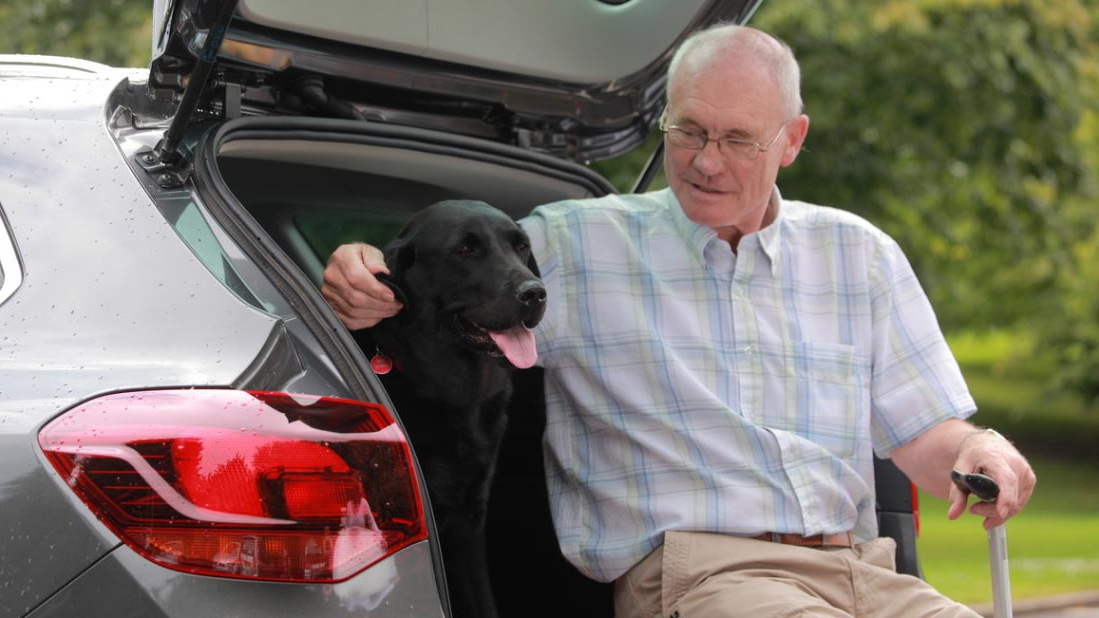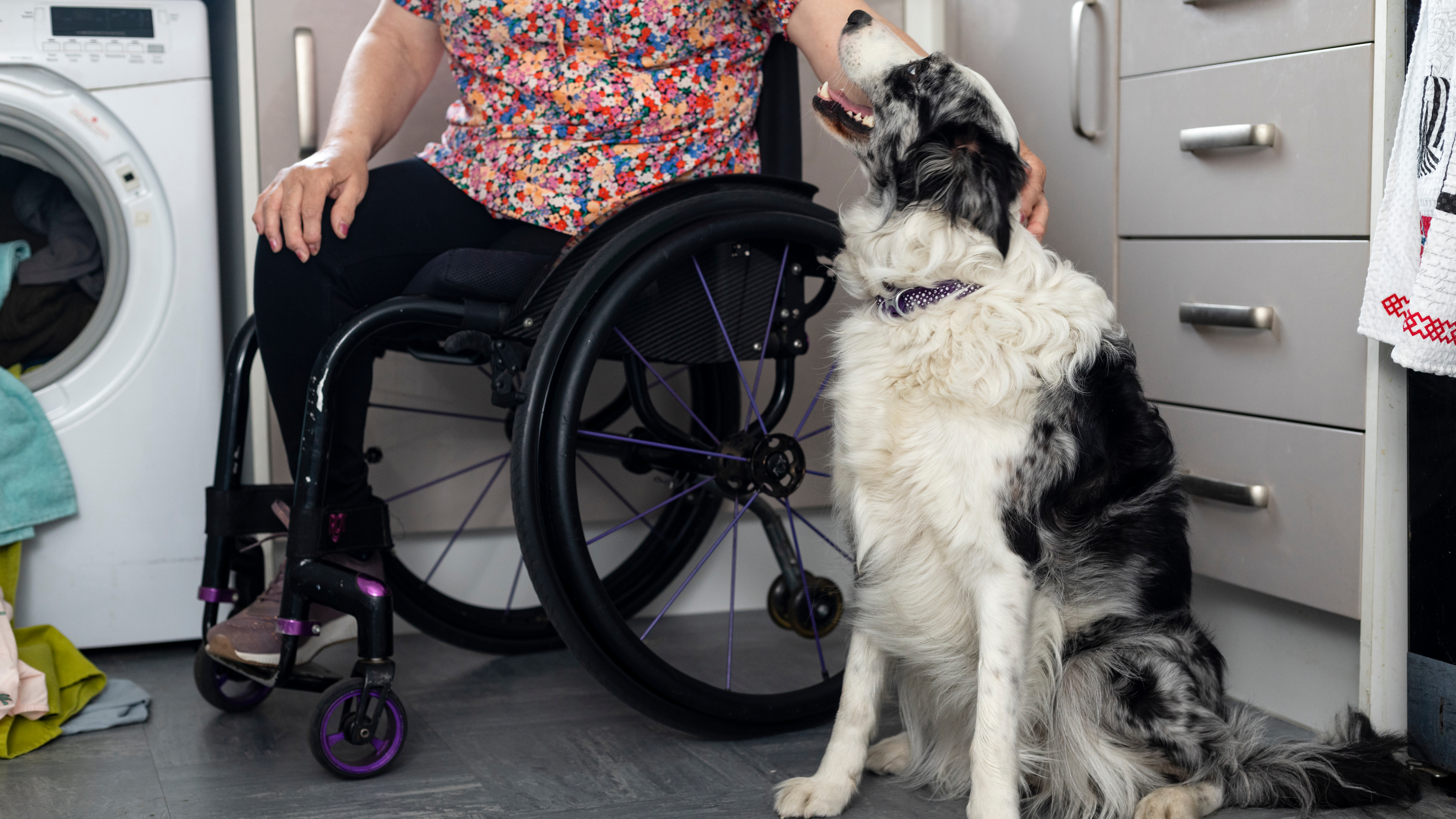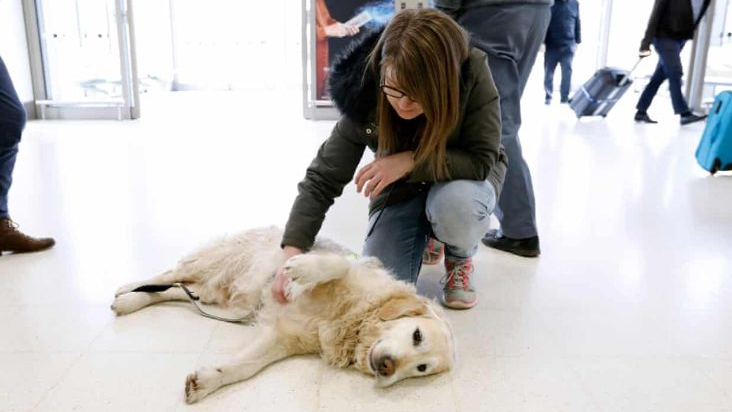Therapy dogs offer mental and physical health benefits without the responsibility of owning a dog.
Plenty of research shows having a pet can be very good for you. As well as having physical effects, such as lowering blood pressure, pets reduce stress and provide companionship.
- What is a therapy dog?
- How therapy dogs differ from assistance dogs
- Mental health benefits of therapy dogs for people with disabilities
- How is a therapy dog trained?
- How to access therapy dogs
What is a therapy dog?
Therapy dogs, which are sometimes called ‘comfort dogs’, are pets that can improve your health and wellbeing by giving you emotional support. Because they’re usually brought to your home, or to a place nearby, you get all the benefits of being with a four-legged friend without the burden and responsibility of looking after it.
As you’d expect, therapy dogs are trained to be gentle and friendly and to accept strangers hugging or petting them. The most common breeds are those with a placid, sociable nature, such as Golden Retrievers, Poodles and King Charles Spaniels. Although dogs are the most common type of emotional support animal, cats can be used as well.
How therapy dogs differ from assistance dogs
Compared with an assistance dog, which is trained to work with people with specific disabilities, a therapy dog has a more psychological purpose. Rather than help you with important tasks in your everyday life as an assistance dog does, they give you emotional support through their presence and affection, to help you feel better. Unlike assistance dogs, anyone can enjoy a therapy dog.
Here are the main differences:
Therapy dogs:
- Give emotional support for people with disabilities
- Take part in activities with different age groups, from children to the elderly
- Improve mental health and well-being through companionship
- Have had special training to become a therapy dog
Assistance dogs:
Getty Images / SolStock ©
- Help people with disabilities with specific tasks, such as fetching items
- Guide people with visual impairments
- Alert people with hearing impairments to sounds
- Alert others of a medical problem, such as a seizure
- Have had special training to become an assistance dog and legally recognized to have public access rights.
Mental health benefits of therapy dogs for people with disabilities
With their sweet nature, special training and unique bond with humans, therapy dogs can comfort and support someone facing physical, emotional, or mental challenges.
A visit with a therapy dog gives you something to look forward to and it can improve your mood. Many people say they feel much better after a visit from a therapy dog.
Here are some of the ways a therapy dog can benefit people with disabilities:
Emotional support and comfort
Therapy dogs offer unconditional love, do not judge and can be truly comforting for someone with disabilities. Their companionship can alleviate feelings of loneliness and isolation.
Reducing anxiety and stress
Simply petting a dog has been shown to reduce stress and anxiety. This can be of particular benefit to people dealing with mental health problems or those having medical treatments.
Improving social interaction
Therapy dogs can encourage interactions and conversations among people. This is especially helpful for people who struggle with be social interactions because of their disability.
Physical health benefits
Engaging with a therapy dog can lead to physical health benefits such as lowered blood pressure, improved heart health, and the release of mood-improving hormones called endorphins that have a calming effect.
There’s plenty of evidence to prove the benefits of therapy dogs. Studies have shown people who spend more time with therapy dogs experience lower levels of stress and anxiety. Also, research suggests that patients recovering from difficult surgery, or a bad accident, can feel less pain after animal therapy.
Anyone with a dog can apply to have it trained to be a therapy dog, if it’s gentle, calm and quiet. You can find out more at the Pets As Therapy site.
For a dog to qualify as a therapy dog, it needs to pass a temperament test to see how it copes with crowded places, sudden noises and being around strangers. The dog must be well behaved and comfortable in lots of different environments. It must also be fully vaccinated.
Organisations such as Pets As Therapy, assess dogs and provide training programs to prepare them and their handlers for therapy work.
How to get a therapy dog
Several different organisations in the UK work with therapy dogs. Caring Canines, Dogs for Good, Therapy Dogs Nationwide and Support Dogs are reputable UK companies that offer a therapy dog service.
Some of these organisations only take their therapy dogs into establishments (usually where there’s an appropriate, comfortable space). In this case, you could use your Motability Scheme vehicle to drive to a therapy dog session.
Interested in reading more stories like this?
Get more tail-wagging stories and heartwarming updates straight to your inbox. Each month, we’ll send you a collection of stories which we think best suit your interests.
Sign up to our newsletter.
Related articles
A guide to understanding assistance dogs
![]()












